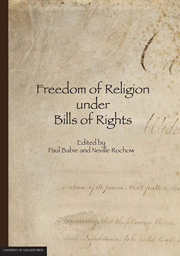Book contents
- Frontmatter
- Contents
- Acknowledgments
- List of Contributors
- Foreword by The Hon Sir Anthony Mason AC KBE: Human Rights and Courts
- INTRODUCTION
- SETTING THE SCENE
- CONTEMPORARY FREEDOM OF RELIGION ISSUES
- COMPARATIVE EXPERIENCE WITH FREEDOM OF RELIGION
- 9 Political Culture and Freedom of Conscience: A Case Study of Austria
- 10 The Sky is Falling if Judges Decide Religious Controversies! – Or is it? The German Experience of Religious Freedom Under a Bill of Rights
- 11 Religious Freedom in a Secular Society: The Case of the Islamic Headscarf in France
- 12 Religious Freedom in the UK after the Human Rights Act 1998
- 13 Judicial Interpretation, Neutrality and the US Bill of Rights
- 14 Protecting Religious Freedom: Two Counterintuitive Dialectics in US Free Exercise Jurisprudence
- 15 Walking the Tightrope: The Struggle of Canadian Courts to Define Freedom of Religion under the Canadian Charter of Rights and Freedoms
- 16 Quo Vadis The Free Exercise of Religion? The Diminishment of Student Religious Expression in US Public Schools
- 17 Freedom from Discrimination on the Basis of Religion
- 18 Ruminations from the Shaky Isles on Religious Freedom in the Bill of Rights Era
- 19 Indigenous Peoples and Bills of Rights
- TABLE OF LEGISLATION AND INTERNATIONAL INSTRUMENTS
- INDEX
17 - Freedom from Discrimination on the Basis of Religion
from COMPARATIVE EXPERIENCE WITH FREEDOM OF RELIGION
Published online by Cambridge University Press: 05 June 2013
- Frontmatter
- Contents
- Acknowledgments
- List of Contributors
- Foreword by The Hon Sir Anthony Mason AC KBE: Human Rights and Courts
- INTRODUCTION
- SETTING THE SCENE
- CONTEMPORARY FREEDOM OF RELIGION ISSUES
- COMPARATIVE EXPERIENCE WITH FREEDOM OF RELIGION
- 9 Political Culture and Freedom of Conscience: A Case Study of Austria
- 10 The Sky is Falling if Judges Decide Religious Controversies! – Or is it? The German Experience of Religious Freedom Under a Bill of Rights
- 11 Religious Freedom in a Secular Society: The Case of the Islamic Headscarf in France
- 12 Religious Freedom in the UK after the Human Rights Act 1998
- 13 Judicial Interpretation, Neutrality and the US Bill of Rights
- 14 Protecting Religious Freedom: Two Counterintuitive Dialectics in US Free Exercise Jurisprudence
- 15 Walking the Tightrope: The Struggle of Canadian Courts to Define Freedom of Religion under the Canadian Charter of Rights and Freedoms
- 16 Quo Vadis The Free Exercise of Religion? The Diminishment of Student Religious Expression in US Public Schools
- 17 Freedom from Discrimination on the Basis of Religion
- 18 Ruminations from the Shaky Isles on Religious Freedom in the Bill of Rights Era
- 19 Indigenous Peoples and Bills of Rights
- TABLE OF LEGISLATION AND INTERNATIONAL INSTRUMENTS
- INDEX
Summary
Broad, noble claims of a right to freedom of religion seem, prima facie, unobjectionable, but, that said, ‘a right which is not recognised by law is nothing but a pious hope’. Allowing people to be discriminated against on the basis of their religious beliefs or practices limits their right to freedom of religion, if indirectly. In any bill of rights that may be introduced, freedom of religion could be included. In my view, however, this would need to be supported by specific and appropriately crafted equal opportunity legislation to afford realistic protection of cultural and religious practices (subject to the constraints of the law generally). Thus, in July 2009 I introduced into the South Australian House of Assembly amendments to the Equal Opportunity Act 1984 to ban discrimination on the basis of religion. My effort was unsuccessful, but I think this is a discussion worth continuing.
In this chapter, I discuss the amendments I proposed, and the reasoning behind them. With reference to State and Territory legislation, International Treaties and bills of rights of other countries, I consider how the proposed amendments would protect the freedom to hold, express, declare and practice religious beliefs and values. I then discuss some objections to this proposal. Finally, I discuss how such provisions might relate to a bill of rights, taking account of concerns expressed by some academics and commentators, who believe that a bill of rights is not the best avenue for such protection.
- Type
- Chapter
- Information
- Freedom of Religion under Bills of Rights , pp. 365 - 370Publisher: The University of Adelaide PressPrint publication year: 2012

